
In this image posted on Oct. 10, 2025, Union External Affairs Minister S Jaishankar during a meeting with his Afghani counterpart Amir Khan Muttaqi, in New Delhi.
Credit: @DrSJaishankar/X via PTI Photo
New Delhi: India will restore the status of its mission in the capital of Afghanistan to that of an embassy and restart supporting development projects in the conflict-ravaged country, External Affairs Minister S Jaishankar said as he hosted the foreign minister of the Taliban regime in Kabul, Amir Khan Muttaqi, in New Delhi on Friday.
Muttaqi sent a stern warning to Islamabad from New Delhi and promised that no group or individual would be allowed to use the territory of Afghanistan against India. “We appreciate your sensitivity towards the security concerns of India,” Jaishankar told his counterpart, who landed in New Delhi on Thursday, after the United Nations Security Council granted him a limited-period exemption from the travel ban that was imposed, along with asset freeze and arms embargo on him and the other leaders of the Taliban.
“We must coordinate efforts to combat terrorism in all its forms and manifestations,” added the external affairs minister.
Islamabad reacted to the latest engagement between the Taliban government in Kabul and New Delhi, by carrying out aerial attacks on Kabul as well as on a market in Afghanistan’s Paktika province near its border with Pakistan.
Though New Delhi, like the majority of the international community, did not formally recognise the Taliban government in Afghanistan, it has been stepping up its engagement with the regime in Kabul, in order to deny Pakistan and China a strategic advantage against India.
“There has been an attack near the border in remote areas. We consider this act of Pakistan a big mistake. Afghanistan has peace and progress after 40 years. No one should have a problem with it,” Muttaqi said on Friday. “We want better relations with India and Pakistan, but it cannot be one-sided…The courage of Afghans should not be tested. If someone wants to do this, they should ask the Soviet Union, America and NATO, so that they can explain that it is not good to play games with Afghanistan,” he told journalists at Kabul’s diplomatic mission in New Delhi – still officially recognised as the embassy of the erstwhile Islamic Republic of Afghanistan, not of the Islamic Emirate of Afghanistan established by the Taliban in September 2021.
The relations between the Taliban and Pakistan turned sour over the past few years. Islamabad has been accusing the Taliban of not doing its bit to deny the terrorist organisation, Tehreek-e-Taliban, a safe sanctuary in Afghanistan and allowing it to carry out strikes in Pakistan.
“We look at India as a close friend,” Muttaqi said, as he sat in a conference hall of the embassy against a wall that had a picture of the ancient statues of Lord Buddha at Bamiyan in Afghanistan, taken before they had been destroyed by the Taliban in March 2001. “Afghanistan wants relations based on mutual respect, trade and people-to-people relations. We are ready to create a consultative mechanism of understanding, which helps towards strengthening our relations.”
Muttaqi is the first Afghan Taliban leader to be publicly hosted by India. His meeting with External Affairs Minister S Jaishankar was India’s highest-level engagement with the Taliban in 25 years. The last one had taken place in December 1999, when the then external affairs minister, Jaswant Singh, had a meeting with the Taliban government’s foreign minister, Wakil Ahmed Muttawakil, in Kandahar and handed over to him three terrorists, including Jaish-e-Mohammad chief Masood Azhar, to secure the release of the crew and the passengers of the hijacked Indian Airlines flight IC-814, which had been hijacked by the terrorists linked to Pakistan.
“India is fully committed to the sovereignty, territorial integrity and independence of Afghanistan. Closer cooperation between us contributes to your national development, as well as regional stability and resilience. To enhance that, I am pleased to announce today the upgrading of India’s Technical Mission in Kabul to the status of Embassy of India,” Jaishankar told Muttaqi.
Unlike in 1996, New Delhi had not formally shut down its embassy in Kabul after the return of the Taliban to power in 2021, two decades after its ouster in 2001. India had evacuated its envoy and other diplomats from Afghanistan in August 2021 but sent back a “technical team” less than a year later to run its mission in Kabul and coordinate the delivery of humanitarian aid – food and medicines – from India.
Muttaqi dismissed as ‘propaganda’ the allegation that the Taliban government in Afghanistan was denying basic rights and freedoms to women. Though, no woman was among the journalists who were invited to the press conference he had in New Delhi on Friday.
He appreciated India’s assistance in the construction and maintenance of the Salma Dam in Herat in Afghanistan. The two sides also underscored the importance of sustainable water management and agreed on India’s support for hydroelectric projects to address the energy needs and support the agricultural development of Afghanistan. Jaishankar formally handed over to Muttaqi five of the 20 ambulances India decided to gift Afghanistan. India expressed its willingness to assist the Afghan government in reconstructing residential buildings in the earthquake-affected areas.
India will also build a Thalassemia Centre and a Modern Diagnostic Centre in Afghanistan, in addition to replacing the heating system at the Indira Gandhi Institute of Child Health (IGICH) in Kabul. India will construct a 30-bed hospital in Kabul’s Bagrami district, an Oncology Centre and a Trauma Centre in Kabul, and five Maternity Health Clinics in the provinces of Paktika, Khost, and Paktia, according to a joint statement issued after the Jaishankar-Muttaqi meeting. They discussed ways to further strengthen cooperation in sports, especially cricket, to advance cultural interactions.
Jaishankar told Muttaqi that India would help construct residences for the Afghan refugees forcibly repatriated by Pakistan and would continue providing material aid to rebuild their lives.
